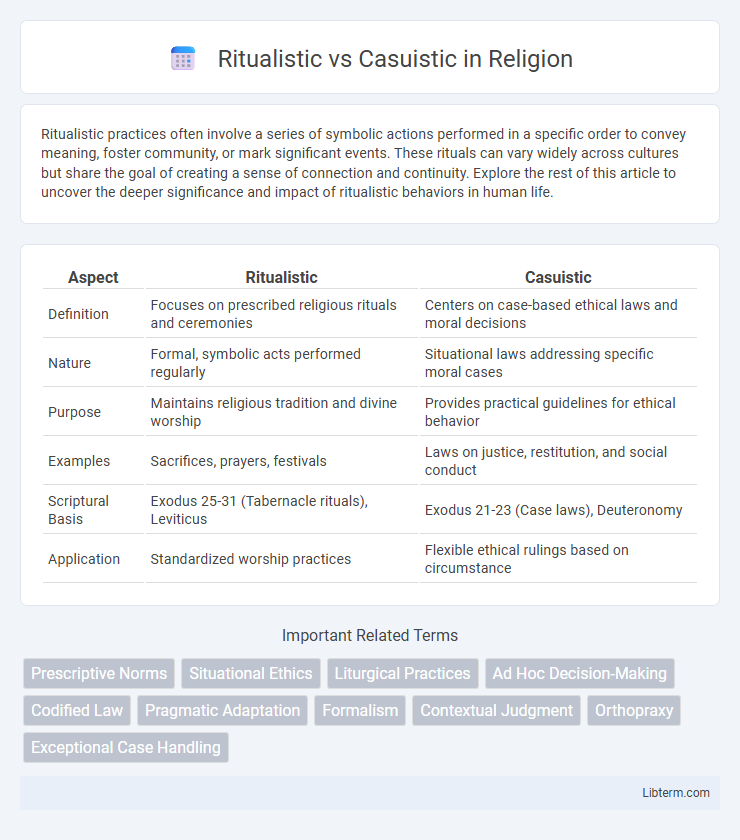Ritualistic practices often involve a series of symbolic actions performed in a specific order to convey meaning, foster community, or mark significant events. These rituals can vary widely across cultures but share the goal of creating a sense of connection and continuity. Explore the rest of this article to uncover the deeper significance and impact of ritualistic behaviors in human life.
Table of Comparison
| Aspect | Ritualistic | Casuistic |
|---|---|---|
| Definition | Focuses on prescribed religious rituals and ceremonies | Centers on case-based ethical laws and moral decisions |
| Nature | Formal, symbolic acts performed regularly | Situational laws addressing specific moral cases |
| Purpose | Maintains religious tradition and divine worship | Provides practical guidelines for ethical behavior |
| Examples | Sacrifices, prayers, festivals | Laws on justice, restitution, and social conduct |
| Scriptural Basis | Exodus 25-31 (Tabernacle rituals), Leviticus | Exodus 21-23 (Case laws), Deuteronomy |
| Application | Standardized worship practices | Flexible ethical rulings based on circumstance |
Understanding Ritualistic Practices
Ritualistic practices emphasize prescribed ceremonies and symbolic actions that reinforce religious or cultural beliefs through repeated, structured behaviors. These rituals often involve precise sequences, sacred objects, and communal participation designed to evoke spiritual connection and maintain tradition. Understanding ritualistic practices requires analyzing their roles in social cohesion, identity formation, and the transmission of cultural values.
Defining Casuistic Approaches
Casuistic approaches emphasize case-by-case analysis in ethical decision-making, focusing on concrete situations rather than abstract rules, distinguishing them from ritualistic practices that follow fixed, ceremonial procedures. This method relies on analogical reasoning, drawing on precedent cases to guide judgments in new, similar circumstances, thereby offering flexibility and context sensitivity. Casuistry's practical orientation aids in resolving moral dilemmas by balancing general principles with the nuances of individual cases, enhancing ethical clarity and applicability.
Historical Origins of Ritualism and Casuistry
Ritualistic practices originated in ancient religious ceremonies, emphasizing prescribed actions and symbolic rites to ensure divine favor, notably seen in early Mesopotamian and Egyptian cultures. Casuistry emerged during the medieval period as a method of moral reasoning within Christian theology, focusing on case-by-case analysis to resolve ethical dilemmas. Both traditions shaped legal and religious thought, with ritualism grounding communal identity through fixed ceremonies and casuistry providing nuanced ethical guidance through hypotheticals.
Key Differences Between Ritualistic and Casuistic Methods
Ritualistic methods emphasize prescribed ceremonies and symbolic actions rooted in tradition, focusing on fixed, repetitive rites. Casuistic methods prioritize case-based reasoning, using specific situational examples to derive ethical or legal principles, allowing more adaptive and context-sensitive applications. The key difference lies in ritualistic approaches relying on formalized customs, whereas casuistic approaches depend on practical case analysis for decision-making.
Ritualistic Beliefs in Religious Traditions
Ritualistic beliefs in religious traditions emphasize prescribed ceremonies and symbolic acts that reinforce community identity and spiritual connection. These rituals often include rites of passage, sacrifices, and worship practices that embody deeper theological meanings and transmit cultural values. The consistent performance of such rituals strengthens faith adherence and provides a structured framework for religious experience.
Casuistic Reasoning in Moral Decision-Making
Casuistic reasoning in moral decision-making centers on analyzing specific cases to derive ethical conclusions, contrasting with ritualistic approaches that rely on fixed rules or traditions. This method emphasizes practical judgment by evaluating circumstances, intentions, and outcomes of individual situations, allowing for flexibility and contextual understanding in ethical dilemmas. Casuistic ethics fosters nuanced decision-making by adapting moral principles to diverse real-life scenarios, enhancing the relevance of moral guidance.
Advantages and Limitations of Ritualistic Systems
Ritualistic systems emphasize formalized ceremonies and symbolic acts that foster social cohesion and reinforce cultural identity, providing individuals with clear behavioral guidelines and a sense of continuity. Their structured nature enhances predictability and stability but may limit flexibility and adaptability to changing circumstances or individual needs. While effective in preserving tradition, ritualistic frameworks can inhibit innovation and may overlook contextual nuances found in casuistic approaches.
The Role of Context in Casuistic Analysis
Casuistic analysis relies heavily on the specific context of each case, examining individual circumstances to draw ethical conclusions rather than applying broad, ritualistic rules. This method prioritizes situational factors, such as cultural norms, stakeholder intentions, and consequences, enabling nuanced moral reasoning tailored to particular scenarios. By contrasting with ritualistic approaches that enforce fixed rites or laws, casuistry offers flexible, context-sensitive guidance in complex ethical dilemmas.
Ritualistic vs Casuistic: Case Studies and Examples
Ritualistic legal systems emphasize fixed ceremonial rules often found in ancient religious codes, such as the Code of Hammurabi, which prescribes specific rites for justice enforcement. Casuistic systems employ case-by-case reasoning illustrated by biblical laws, like those in Exodus, where "if-then" scenarios create tailored judicial responses. Case studies reveal that ritualistic laws prioritize uniformity and tradition, while casuistic laws adapt to varying circumstances for nuanced dispute resolution.
Contemporary Relevance of Ritualistic and Casuistic Approaches
Ritualistic and casuistic approaches maintain contemporary relevance by influencing modern legal and ethical frameworks; ritualistic methods emphasize formal procedures and symbolic acts, which shape ceremonial practices and institutional rituals in governance and religion. Casuistic reasoning, centered on case-based analysis and precedent, underpins judicial decision-making and ethical deliberations, promoting adaptability and nuanced interpretation in diverse contexts. These approaches collectively enhance understanding of rule application in dynamic social environments, balancing tradition with practical problem-solving.
Ritualistic Infographic

 libterm.com
libterm.com